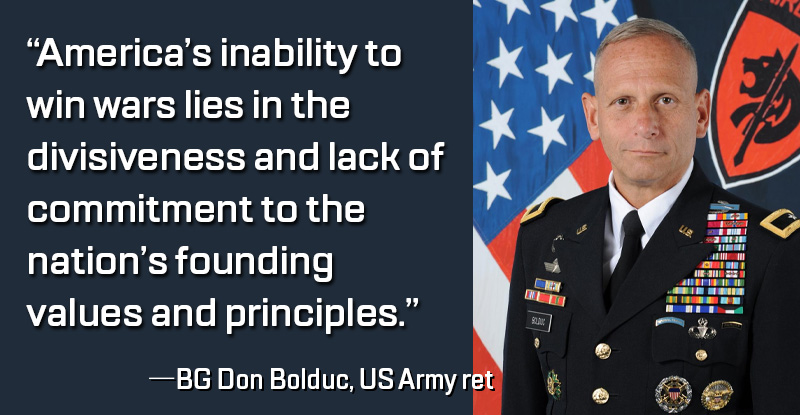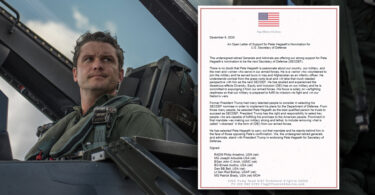By BG Don Bolduc, US Army ret
The ability to win wars and conflicts is vital to a nation’s sovereignty and security. However, in recent decades, the United States has faced numerous challenges in achieving victory in conflicts.
This essay explores the notion that America has forgotten how to win wars, attributing this phenomenon to
- the divisive nature of politics,
- the lack of commitment to the nation’s founding values and principles,
- weak leadership, and a
- failure to support allies.
This lack of strategic vision and operational effectiveness has hindered the United States’ ability to prevail in conflicts since World War II.
Divisiveness and Lack of Commitment to Founding Values
One of the primary factors contributing to America’s inability to win wars lies in the divisiveness and lack of commitment to the nation’s founding values and principles.
Politicians, driven by partisan interests, have prioritized short-term gains over long-term strategies to combat enemies effectively.
This partisan divide prevents the formulation of coherent policies, as politicians tend to focus more on scoring political points than pursuing winning strategies.
The erosion of national unity and a shared sense of purpose has further hindered America’s ability to win wars.
Without a collective commitment to a common cause, it becomes increasingly challenging to rally the nation behind a war effort.
Consequently, lacking a united front weakens the resolve and determination necessary for victory. Congress needs to do more in its constitutional responsibility to declare wars and then monitor, ensure accountability, and adequately resource the conflict on behalf of the people.
Weak and Politicized Leadership
Another significant factor contributing to America’s struggle to win wars is the growing focus of senior military and civilian leadership on politics rather than achieving victory.
The rise of career politicians and the increasing influence of special interest groups have diluted leadership effectiveness as decision-making becomes entangled in political calculations.
This politicization of leadership has resulted in a lack of strategic vision and a failure to devise winning policies.
Instead of prioritizing the nation’s security and interests, leaders often take short-sighted actions to appease their base, leading to a lack of commitment to long-term success.
Lack of Strategy, Operational Art, and Tactical Efficacy
The absence of a clear and comprehensive strategy, operational art, and effective tactics has further contributed to America’s inability to win wars since World War II.
A successful military campaign requires a well-defined plan that aligns the nation’s objectives with the available resources and capabilities.
However, a lack of strategic foresight has often resulted in disjointed and reactive responses to conflicts and an approach that takes a twenty-year war and fights it one year at a time.
Lack of Military Service in Congress and Groupthink
The shortage of military service in Congress significantly contributed to America’s struggle to win wars.
Without firsthand experience in the military, lawmakers may lack the necessary understanding of the complexities of warfare, resulting in misguided decisions and policies.
This knowledge gap can lead to a disconnect between the military’s needs and the resources provided, hindering the armed forces’ effectiveness.
Moreover, the reliance on think tanks and professionals from elite academic institutions can perpetuate a sense of groupthink within the decision-making process.
The dominance of certain perspectives and ideologies can limit the range of ideas and approaches considered, leading to a repetition of past mistakes.
This lack of diversity in thought stifles innovation and prevents the exploration of alternative strategies, tactics, and operational art that may be necessary for victory.
The Military-Industrial Complex
The dominance of the military-industrial complex also contributes to America’s inability to win wars.
The intertwining relationships between defense contractors, politicians, and the military establishment can lead to prioritizing profit over the pursuit of victory.
This complex network of interests may perpetuate conflicts for economic gain rather than a genuine commitment to achieving strategic objectives.
Furthermore, the influence of the military-industrial complex can lead to a focus on technological superiority and firepower, often neglecting the importance of counterinsurgency tactics, diplomacy, and gaining the support of local populations.
This overreliance on advanced weaponry alone can undermine the effectiveness of military operations, as success in modern warfare often requires a nuanced approach that addresses the root causes of conflicts.
Forgotten Support for Allies
Lastly, America’s failure to support its allies significantly impacts its ability to win wars.
Historically, the United States has relied on solid alliances to achieve success in conflicts. However, a lack of commitment to supporting allies has strained these relationships in recent years.
This hesitancy to stand by partners erodes trust and diminishes the effectiveness of collective efforts.
The Afghanistan withdrawal is the latest example and has emboldened China, Russia, Iran, and North Korea. No one in the Biden Administration was held responsible for the debacle. The National Security Team failed and kept their jobs. The Generals and Admirals at all levels died, supported their jobs, and got promoted. Congress failed and continues to fail to do its job.
The failure to adequately support allies has resulted in losing vital strategic advantages.Refrain from providing necessary resources, intelligence sharing, and diplomatic support to strengthen the overall coalition, making it more difficult to achieve victory.
With a strong network of allies, the United States can navigate complex conflicts and win against determined adversaries.
Conclusion
In conclusion, America’s struggle to win wars at the strategic level since World War II can be attributed to various factors.
Divisiveness and a lack of commitment to founding values, weak and politicized leadership, and the factors mentioned above, including the absence of military service in Congress, the practice of consistently relying on elite institutions and think tanks, the influence of the military-industrial complex, failure to hold Generals and Admirals accountable, and the neglect of supporting allies, all contribute to a cycle of groupthink, organizational nepotism, and repeated mistakes.
Addressing these issues requires a comprehensive approach. Encouraging more military veterans to enter politics and serve in Congress can provide valuable firsthand perspectives and expertise.
Diversifying the sources of advice and input in decision-making processes can help break the cycle of groupthink and promote innovative approaches to warfare.
Furthermore, stopping rubber stamping 3- and 4-Star level promotion lists, greater scrutiny, and regulation of the military-industrial complex can help ensure that the pursuit of profit does not overshadow the pursuit of victory.
Prioritizing diplomacy, technology, counterinsurgency tactics, and support for allies can also enhance America’s chances of success in future conflicts.
Ultimately, winning wars requires a holistic and multifaceted approach that considers the complexities of modern and future warfare.
By addressing the factors contributing to America’s inability to win wars, the nation can better position itself for success and achieve its strategic objectives.
General Don Bolduc (Army Ret.) started his career as a private in the United States Army. He did 10 tours in Afghanistan from 2001-2013. He now advocates for veterans and is an Associate Professor at New England College. He is a Laconia, NH native and resides in Stratham, NH.








Leave a Comment